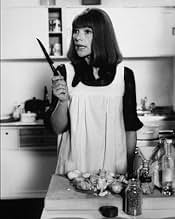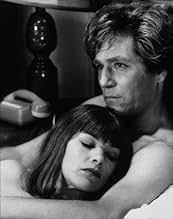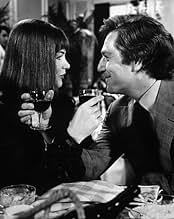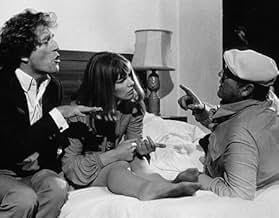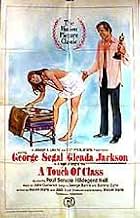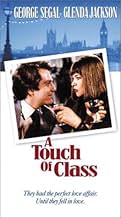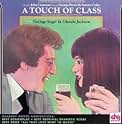Une maîtresse dans les bras, une femme sur le dos
Original title: A Touch of Class
- 1973
- Tous publics
- 1h 46m
IMDb RATING
6.5/10
3.8K
YOUR RATING
An insurance man and a recently divorced female fashion designer become clandestine lovers in a London-Spain tryst.An insurance man and a recently divorced female fashion designer become clandestine lovers in a London-Spain tryst.An insurance man and a recently divorced female fashion designer become clandestine lovers in a London-Spain tryst.
- Director
- Writers
- Stars
- Won 1 Oscar
- 11 wins & 10 nominations total
K Callan
- Patty Menkes
- (as K. Callan)
Ève Karpf
- Miss Ramos
- (as Eve Karpf)
Timothy Carlton
- Gay Worker
- (uncredited)
- Director
- Writers
- All cast & crew
- Production, box office & more at IMDbPro
Featured reviews
A love story with a built-in dead end: they're crazy about each other, but he's already married. Attempt to recapture the sophisticated romantic-comedies of yesteryear is put to the test under a heavy-handed direction which doesn't know what it's going for, laughs or pathos (the former occasionally bumping clumsily into the latter). There's nothing wrong with a good mix of laughs and tears, but this scenario is cluttered up with too many dolts (like Paul Sorvino's "best friend" character, who is tiresome the minute we meet him) and too many montages which set no certain mood. Oscar-winner Glenda Jackson is warmly sarcastic throughout--and she's delightful working with George Segal--but their characters lost my interest after an hour or so. There's too much bickering over nothing, too much intensity melting away into love-starved giggles. The picture is a situation comedy but there are only occasional laughs, all early on. ** from ****
Bittersweet comedy helped immeasurably by the chemistry of the stars and the skill of their performances. Glenda is brash and delicate in equal measure, George bombastic but good natured. While it shows the pitfalls of infidelity it doesn't judge its characters for their choices and actually presents all the relationships, including Glenda's gay assistant's, evenhandedly rather surprising for the 70's. As far as her receiving an Oscar for this performance, she's sprightly and more relaxed than she usually was on screen but I doubt that even she expected to grab the prize for what is a customary solid job but hardly extraordinary.
You've got to view this as a reflection of the Sexual Revolution in its full 70s "swinging" mode, where infidelity within an unhappy marriage was viewed as less simply immoral than now. As such it's a charming time capsule with very good casting. I thought this movie was terrific (albeit imperfect) at the time, when I saw it as a teenager. Of course it seemed very sophisticated to me then--and it made me infatuated with George Segal, who seemed so goofy and charming and attractive. A perfect post-Bobby Sherman interest for a curious 12- year-old.
As for Jackson's Best Actress win--well, there really weren't a lot of good roles for women at the time. This is a particular instance (like Louise Fletcher's very-supporting Best Actress win for "Cuckoo's Nest") that proves how dismal the competition was in that era. Of course there were fine actress performances in films during the 70s, albeit ones too small or too foreign or too art-house-y to be noticed by the Academy. But really, the whole era just sucked in terms of substantial women's leading roles.
The film's own dated sexism is apparent in its obliviousness toward divorcée Jackson's drop- everything-whenever-called neglect of her children (guess she has nothing better to do!) whereas much attention is given to Segal's neglect of his wife and children (he's a guy, so of course he's got better things to do!). As if her commitments aren't important, while his naturally are.
"A Touch of Class" seemed overrated at the time (this movie got multiple Oscar nominations in the same year as "Mean Streets"?!?), and it hasn't aged brilliantly. Nonetheless, it's an excellent example of a romantic comedy reflecting a very different moral complexity than movies allow nowadays.
As for Jackson's Best Actress win--well, there really weren't a lot of good roles for women at the time. This is a particular instance (like Louise Fletcher's very-supporting Best Actress win for "Cuckoo's Nest") that proves how dismal the competition was in that era. Of course there were fine actress performances in films during the 70s, albeit ones too small or too foreign or too art-house-y to be noticed by the Academy. But really, the whole era just sucked in terms of substantial women's leading roles.
The film's own dated sexism is apparent in its obliviousness toward divorcée Jackson's drop- everything-whenever-called neglect of her children (guess she has nothing better to do!) whereas much attention is given to Segal's neglect of his wife and children (he's a guy, so of course he's got better things to do!). As if her commitments aren't important, while his naturally are.
"A Touch of Class" seemed overrated at the time (this movie got multiple Oscar nominations in the same year as "Mean Streets"?!?), and it hasn't aged brilliantly. Nonetheless, it's an excellent example of a romantic comedy reflecting a very different moral complexity than movies allow nowadays.
I saw this movie when I was twenty-three years old. Paul Sorvino's line or question never really made any sense to me. He asked Steve (George Segal) if he loved her (Vicky, Glenda Jackson) enough to give her up. What kind of a nonsensical question is that? Vicky had nothing to lose with Steve choosing her. She would only lose if he DIDN'T choose her. So what does she get when Steve blows her off? Exactly what she already had. Suppose however that Sorvino had asked Vicky that question. THEN it would have made sense. Because Vicky would have been making a choice between having NOTHING or having Steve at the price of destroying a happy marriage. Vicky would have actually SACRIFICED something, her own "happiness" for Steve. But Steve wouldn't have the same sacrifice presented to him. His choice was simply, THIS woman, whom you love, or THAT woman, whom you also love. BFD!
2 years later, I found myself in such a situation (from the Vicky perspective), in circumstances so unique, I might as well have been in another galaxy. And I made the wrong choice. I destroyed a relationship and as for myself, I wound up with nothing anyway.
2 years later, I found myself in such a situation (from the Vicky perspective), in circumstances so unique, I might as well have been in another galaxy. And I made the wrong choice. I destroyed a relationship and as for myself, I wound up with nothing anyway.
A Touch of Class starts off being about a married cad's misadventures in attempting to hook up with a divorced woman who's up for the no-strings-attached sex. It makes the movie's title somewhat ironic, doesn't it?
More than likely, "A Touch of Class" refers to double-Oscar winner Glenda Jackson (Women in Love and this movie), who's just about one of the classiest actresses I've seen. Beautiful, regal, and armed with acerbic British wit, she's the perfect foil to the brash and American George Segal, who incidentally looks just about the same 30 years ago as he does now in Just Shoot Me, except with a better body.
A Touch of Class demonstrates how opposites attract - something I've very familiar with. It's a romantic comedy but its comedic element peaks halfway through the movie with a scene in which the two leads engage in an all-out battle that culminates in a clothes fight and a sex fumble. After that, it's primarily about the two trying to make their love affair work despite Segal's marriage. A successful romantic movie draws us into its convolutions by making us care for its characters and what become of them, which A Touch of Class achieves by giving us the realistic trials and tribulations of an extramarital couple.
More than likely, "A Touch of Class" refers to double-Oscar winner Glenda Jackson (Women in Love and this movie), who's just about one of the classiest actresses I've seen. Beautiful, regal, and armed with acerbic British wit, she's the perfect foil to the brash and American George Segal, who incidentally looks just about the same 30 years ago as he does now in Just Shoot Me, except with a better body.
A Touch of Class demonstrates how opposites attract - something I've very familiar with. It's a romantic comedy but its comedic element peaks halfway through the movie with a scene in which the two leads engage in an all-out battle that culminates in a clothes fight and a sex fumble. After that, it's primarily about the two trying to make their love affair work despite Segal's marriage. A successful romantic movie draws us into its convolutions by making us care for its characters and what become of them, which A Touch of Class achieves by giving us the realistic trials and tribulations of an extramarital couple.
Did you know
- TriviaGlenda Jackson's Best Actress Academy Award win for this movie was so shocking to viewers of the ceremony that a recount was considered for the votes. The Oscar was rumored to be going to Marsha Mason for 'Cinderella Liberty' (1973) or Ellen Burstyn for 'The Exorcist' (1973) as they were the front runners.
- GoofsEarly on in the film, when Vicki and Steve first share the taxi, it is reflected in the windscreen of the taxi just as it pulls up to drop Vicki off in the rain.
- Quotes
Vickie Allessio: [Steve has just asked Vickie to lunch] Oh, what the hell. A girl has to eat.
- ConnectionsFeatured in It'll Be Alright on the Night 2 (1979)
- How long is A Touch of Class?Powered by Alexa
Details
- Release date
- Country of origin
- Languages
- Also known as
- A Touch of Class
- Filming locations
- Production companies
- See more company credits at IMDbPro
Box office
- Gross US & Canada
- $18,312,000
Contribute to this page
Suggest an edit or add missing content

Top Gap
By what name was Une maîtresse dans les bras, une femme sur le dos (1973) officially released in India in English?
Answer


